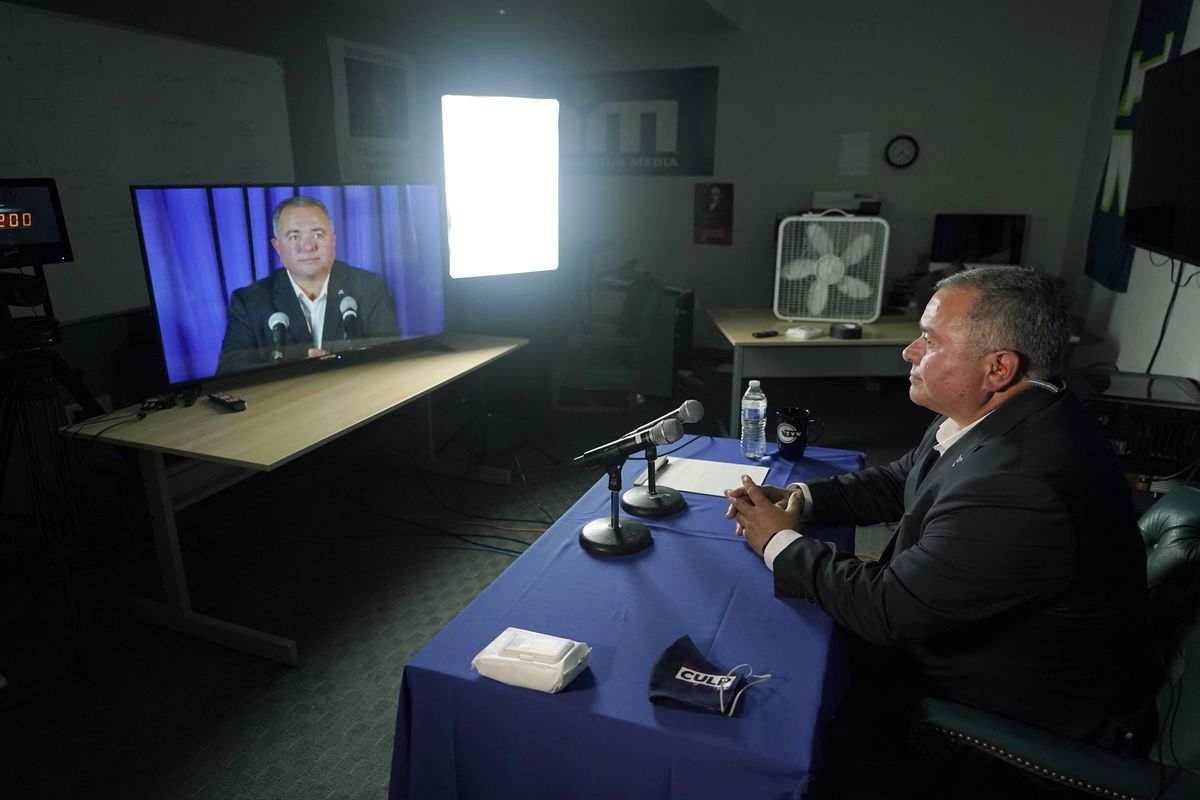Inslee, Culp spar over COVID-19, protests

Gov. Jay Inslee accused his Republican opponent of being a “mini Trump” and challenger Loren Culp accused the incumbent of being a career politician “who has no clue what it’s like in the real world” during a spirited debate Wednesday night.
They clashed on the best way to handle the COVID-19 pandemic, civil unrest and whether the state is good for business. As they traded barbs, they sometimes seemed to be running to lead two different states.
Culp was asked whether he takes the pandemic seriously enough as he holds rallies around the state with hundreds of people who don’t wear masks or practice social distancing.
“I’ve never come out and spoken against wearing masks,” he said. Instead he’s spoken against a government order for businesses and individuals to wear masks, he added.
“I firmly believe in individual freedom and liberty,” he said.
Inslee said that part of leadership is modeling proper behavior and safety protocols. The series of steps he took since March, which included a Stay Home Stay Safe order in March and phased reopening of counties that started in the summer but has since paused, is saving lives because most people are following the guidelines, he added.
“This is working. They are wearing masks; they are social distancing,” he said.
Inslee also contended that Republicans, President Donald Trump and Culp want to take away health care some 800,000 state residents receive through expanded Medicaid.
“It’s too dangerous to have a mini Trump right now in the middle of a pandemic,” Inslee said, in one of several attempts to link his opponent to the president.
Culp said Inslee repeatedly tried to tie him to Trump, and called the people who support him “Trumpian.”
“Is that the new ‘deplorables,’ governor?” he asked, a reference to a derogatory term Hillary Clinton used for Trump supporters in the 2016 election.
It was the first, and so far only. scheduled meeting between the two. Inslee, who is seeking his third straight term, easily topped the Aug. 4 primary field. Culp, the chief of the Republic Police Department and first-time candidate, finished ahead of four other serious GOP rivals in a field of 35 challengers that included a mixture of minor party and perennial candidates. The journalists asking questions were in one room, and the candidates were in other, separate rooms.
Culp may have scored points with viewers when talking about the state’s response to protests that turned violent after incidents of Black citizens killed by police officers elsewhere in the country. He charged Inslee was “oblivious” after a group of protesters seized a small section of Seattle to form the Capitol Hill Autonomous Zone earlier this year
“I could not have been oblivious,” Inslee replied, adding he sent in the National Guard.
One of the moderators noted, however, that Inslee did say at a press conference a day after the area was seized that he didn’t know about it.
“If I made a misstatement, I made a misstatement,” he said.
Culp also criticized Inslee for sending the Guard in without weapons, adding as governor he would never send them to such a situation unarmed. Inslee countered that the elected officials who requested the Guard had asked that they not be armed, and the adjutant general agreed that more firearms on the streets was not the answer.
The state was a bad place to do business and that he would cut costly regulations to turn that around and create more jobs, Culp said. As someone who built a construction business, he contended he’d be able to do more for business than Inslee.
“The governor has lost touch with reality. He has been in government too long,” he said.
Inslee countered that the state is rated by some groups as the best place to do business with strong help for workers and families. During his tenure, the state has enacted family and medical leave laws, the nation’s highest minimum wage and a long-term care program.
“People are moving here like crazy. This is a growth oriented state,” he said.
One of the sharpest contrasts was on whether they believed there was systemic racism and a need for police reform.
Inslee said he believes systemic racism does exist and the state has done things to combat it like expanding opportunities for education, jobs and health care. He added he has appointed a group to study possible changes that could introduced in the 2021 Legislature, such as ending qualified immunity that protects police from some civil claims and requiring independent investigations of police shootings.
Culp said that while there are “racists among us” who need to be rooted out if they commit crimes, he disputed whether there is systemic racism because federal and state laws say everyone is to be treated equally.
“The biggest way that you bring in racial inequality is when you don’t enforce the law evenly,” he said. Inslee should do more about the problem of human trafficking, he added.
He disagreed with the suggestion that qualified immunity protects abusive officers because officers who commit crimes are prosecuted “all the time.”
When pressed by Melissa Santos of KCTS and Crosscut about instances in which a department fires officers for an improper action and is forced to rehire them, Culp asked for an example. Santos described a situation in Seattle in which an officer struck a handcuffed woman in the face, causing serious injuries, was fired and then reinstated through arbitration.
“That sounds like Chief Best’s department, and you’re telling me she’s not for law and order and she’s racist in some way?” Culp asked, naming Seattle’s former police chief, who is Black.
“I did not say that,” Santos replied.
“I do not know the details of that case. Any time an officer abuses their power, they should be held accountable,” he said.